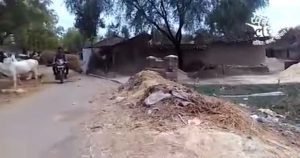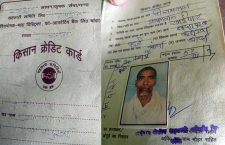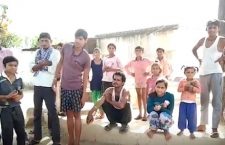 Khabar Lahariya gets under the skin of a very peculiar caste-based practice in Chitrakoot that turns reservation on its head.
Khabar Lahariya gets under the skin of a very peculiar caste-based practice in Chitrakoot that turns reservation on its head.
Video Report
It was in 2016 in Ahmedabad that the Human Development and Research Centre (formerly Behavioural Science Centre) issued a vacancy advertisement for the job of a sanitation worker in their offices. Based on earlier experiences wherein they had received applications only from people of the Valmiki caste, the progressive firm decided to add in a line about their preference for applicants of higher castes. It wasn’t too long before the director of the organization, Prasad Chacko, was forced into hiding – such was the wrath of the backlash he received.
In 2018, in Bundelkhand, the sentiments behind this story thrive in peculiar ways, so ingrained are the caste-hierarchy beliefs that drill deep into our very souls the linkages between dirty jobs and “unclean” communities. From cattle-skinning to manual scavenging to basic cleaning, the caste of those who do this for a living comes as no surprise, and in the hinterland, this has crystallized into a very specific practice of discrimination. If you check the records for government-employed sanitation workers, chances are you’ll find a list of names reflecting their O.B.C. and general caste-affiliations – the Kushwahas and Prajapatis and Guptas. But if you ask for last names of those who actually wield the jhadu and the pan, these would invariably be those belonging to the Valmiki, Chamar and Adivasi communities. In Chitrakoot district’s Ramnagar block, we looked at the three villages of Atarsui, Chheebo, and Basingha as a sample size report, and found that upper caste members are pocketing the 22,000-a-month salary, and outsourcing the dirty jobs to lower-caste workers, paying them on adhoc basis, at paltry sums of Rs. 200-300 as daily wages. It is a scam of the worst kind, riding on caste-discrimination.
Mukesh, a Basingha village resident, tells us about the times he’s been called in for school emergencies, “If a dog comes and shits all around the school premises, then they call me that day. Generally, I’m given 200 bucks for it.” When we prod him, asking why he’s called by the appointed sanitation worker, he simply shrugs, “I don’t know why. He gives me money, I take it.” Kamlesh Prasad, the headmaster at the school condemns this for the sake of the interview, at least, “It is wrong, indeed. Whoever has been appointed on paper should be the one actually doing the cleaning.” But it is Triveni Prasad’s response that is telling. As Basingha pradhan, he speaks of the assigned cleaner, “Yes, he’s a Prajapati. Yes, he gets someone else to clean on his behalf, a Mehtar, I think.” When we ask him of the discrimination inherent in this, he only has a matter-of-fact response, “It’s been working out fine thus far. Ab safaai se matlab hai, chaahe jisse bhi karvaaye ya kare. (We only care about cleanliness, either he does it himself, or gets someone else to). What difference does that make?” Shailendra Kumar, the headman’s representative at Chheebon village nods and tells us he’s heard of this practice making it sound like it’s a distant problem. He offers advice as if it hadn’t occurred to us, “Jaankaari praapt ki ja sakti hai (You can get the information) by checking the names on the list.”
It is indeed this inability to even recognize this as discrimination that sees this practice thriving so.
Meanwhile, the Clean India deadline looms large – even the extended one – and several of the on-paper sanitation workers work as drivers and assistants, in real life, not bothering to turn up for duties that do not suit their caste-preferences. But while Ram Lal Mishra, A.D.O., Chitrakoot, adds how people should be more responsible – a platitude if there ever was one – Virendra Yadav at Basingha enlists the problems being caused by lack of hygiene – they’ve been AWOL for over six months, we learn. “There’s dirt and filth everywhere, mosquitoes are breeding, diseases are spreading…” And fellow Basingha dweller Durg Vijay Singh is enraged at the filth in his village, “I am an illiterate man, I don’t know whose responsibility it is. But we live in such disgusting conditions.”
Shakti Singh, Mau-Manikpur’s BJP MLA RK Patel’s spokesman gives us the official line, “Someone’s working as a driver, or a guard. And we’ve ensured that they’ve gone back to their appointed jobs.” If we can point out those who don’t report for work, Singh added, he’ll ensure they’re dealt with strictly, using every Bundeli officer’s favourite term – “sakht karavahi.”
And Ganga Ram, pradhan, Atarsui village, mulls over the unique problem of every safai-karmi turning into a cook overnight, “I think there should be a proper examination of this.”
– Pooja Pande
This story is Part III of an ongoing Dalit: Kaam, Pehchaan, Rajneeti special series through this Dalit History Month, for which we’re partnering with Firstpost.

